Art on the Great Rides
While the 23 Ngā Haerenga Great Rides feature the best of New Zealand’s scenery by bike, many also showcase an array of art along the way.
From art installations and sculptures to landscape features and art exhibitions, riders will discover the artworks of many talented Kiwis and their back stories on their travels.
Here we highlight a few of the increasing number of artworks you’ll find on the Great Rides.
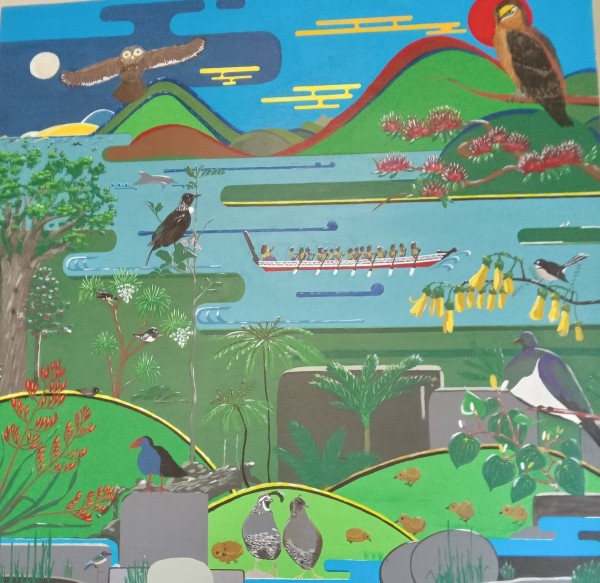 Horeke Art Board artwork by the Tokumei whānau
Horeke Art Board artwork by the Tokumei whānau
Pou Herenga Tai - Twin Coast Cycle Trail Great Ride
In the far north at the Horeke end of the Twin Coast Cycle Trail, you’ll find 16 art installations created by talented local artists, both adults and children.
The installations feature 16 physical artboards. An explanation about each art piece’s meaning and information on the artists can be found on the Twin Coast Trail's website.
That information is accessible via the QR code attached to each art piece.
Artwork titled "Kuramarotini" by Daryl Puata
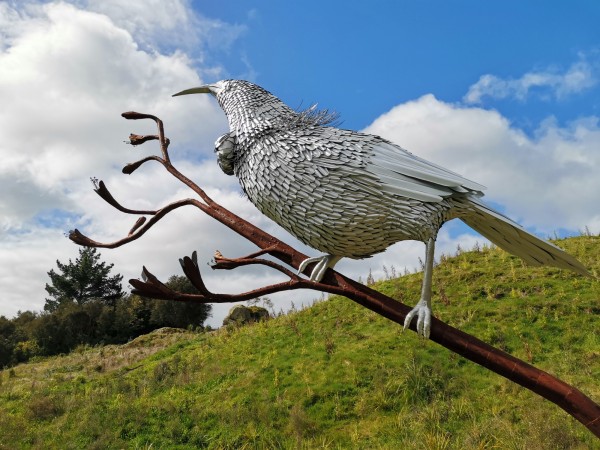 Steve Clothier's tui on corrugated iron was inspired by the local bird population
Steve Clothier's tui on corrugated iron was inspired by the local bird population
Waikato River Trails Great Ride
On the Waikato River Trails, you’ll follow New Zealand’s longest river through native bush, exotic forest, remote farmland, boardwalks, streams, suspension bridges and magnificent hydropower dams.
But you’ll also come across some amazing larger-than-life artworks, mostly made of corten steel.
On the Karapiro section is the tui sculpture that towers above the giant toe toe tussock grasses on the hillside. The sculpture was formed from corrugated iron by local artist Steven Clothier in nearby Tirau, dubbed the "corrugated iron capital of the world".
Towards the end of the Karapiro section you can admire the arched steel sculpture designed by highly acclaimed New Zealand artist and contemporary sculptor, the late Fred Graham. His sculpture encapsulates details of historical significance to Māori in relation to the Pokaiwhenua area, signifying both a bridge that is no longer there, and a rainbow that used to form from the sun shining through the spray from a set of nearby rapids before the river was dammed.
Adding to the birdlife on the Whakamaru section is a large steel morepork sculpture whose wings dramatically span the width of the trail. The morepork was created by James Wright, a New Zealand sculptor whose inspiration is drawn from his heritage and rural upbringing, and provides a dramatic backdrop for a trail photo.
Along the trail, there’s also a corten steel frame inspired by pieces of old bikes from a local bike shop, and another corten steel viewing frame at Lake Karapiro made by year 10 art students at Putararu College.
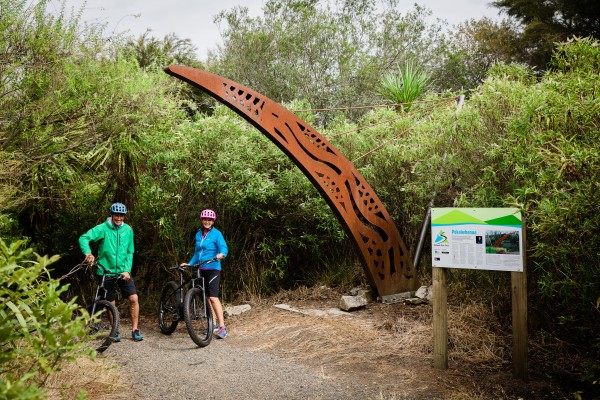 As a child, renowned Māori artist, the late Fred Graham, lived close to the site of this piece
As a child, renowned Māori artist, the late Fred Graham, lived close to the site of this piece
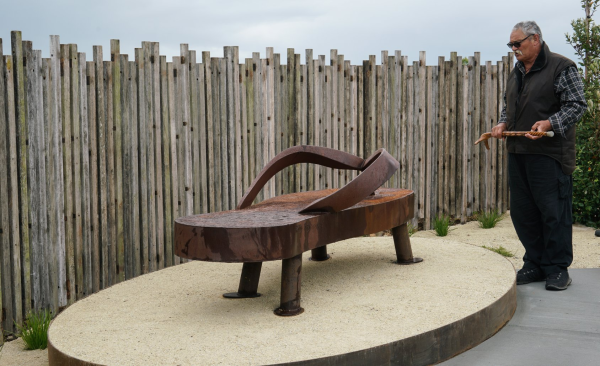 Ngati Maru kaumatua Wati Ngamane performs a blessing at the opening of Jandel on the Mandel.
Ngati Maru kaumatua Wati Ngamane performs a blessing at the opening of Jandel on the Mandel.
Photo: Thames Public Art Trust
Hauraki Rail Trail Great Ride
The Thames Public Art Trust is behind enhancing the visitor experience on the Hauraki Rail Trail with sculptures outside of the traditional art gallery.
The sculpture trail also enables artists to exhibit their works in natural surroundings and in open space while giving trail users a chance to discover a variety of local art installations.
Towards the Thames end of the Kopu-Thames section is the very first artwork to be installed - the large bronze Jandal on the Mandel by artist Ricks Terstappen. There's also The Spheres by Paeroa artist Mark Hayes and Bruce Harper's Penny Farthing, to name just a few.
There’s also Te Aroha sculptor Adrian Worsley’s series of bike rack sculptures that combine art with practicality around the town, like the iconic dachshund bike stand.
More recently, John McKeowen's Miners' Gates sculpture was installed on the Ngāti Maru Highway near Thames Airfield. The 3m-tall sculpture is constructed from old railway sleepers and represents both the structure of a mining tunnel and the historic rail lines.
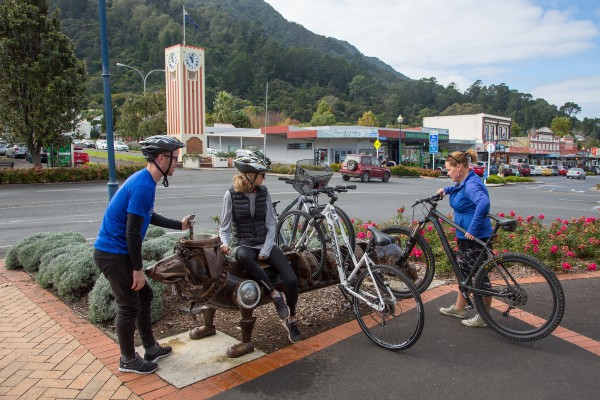 Sculptor Adrian Worsley's popular dachshund bike stand
Sculptor Adrian Worsley's popular dachshund bike stand
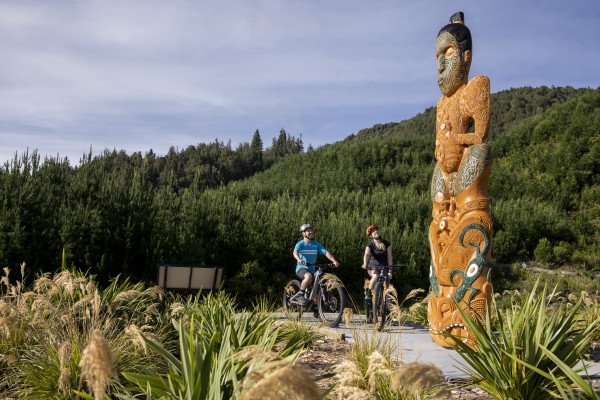 Umukaria by Tukiri Tini. Photo by Graeme Murray
Umukaria by Tukiri Tini. Photo by Graeme Murray
Whakarewarewa Forest Loop Great Ride (Rotorua)
From interpretation panels to whakairo (Māori carvings), Rotorua's Whakarewarewa Forest Loop Great Ride has worked alongside those who are mana whenua of the lands the trail passes through.
Among the statues is Wāhiao (son of Umukaria). Iwi Le Comte used a 10 tonne rock deposited in the forest during the 1886 Tarawera eruption and affixed a bronze mask recognising Wāhiao’s leadership, mana and strength.
Artist Tukiri Tini chose the traditional form of toi whakairo (art of wood carving) to carve the 4m tall Tōtara Umukaria.
The taonga Kēti Tāniko (modern Tūhourangi design) created by Denise Morgan-Koia uses sheet steel and is inspired by the Tūhourangi Ngāti Wahiao (tribe of Whakarewarewa) Kapa Haka tāniko pattern.
Artist Tāwhanga Rika created his sculpture of Kataore from corten steel and mātai. Representing the ancient massive lizard or taniwha, the disk is 4m in diameter and sits 3m high.
Lastly, the historical romance of Hinemoa and Tūtānekai has been immortalised in this 3.5m high cement taonga above, sculpted by Okiwi Shipgood.
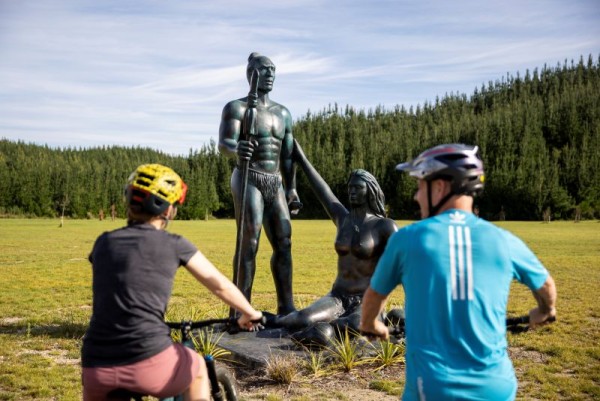 Hinemoa and Tūtānekai by Okiwi Logan Shipgood. Photo by Graeme Murray
Hinemoa and Tūtānekai by Okiwi Logan Shipgood. Photo by Graeme Murray
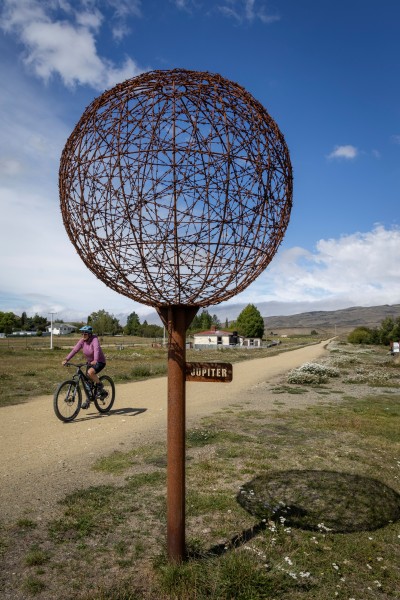 Jupiter on the Interplanetary Ride. Photo by Geoff Marks
Jupiter on the Interplanetary Ride. Photo by Geoff Marks
Otago's Great Rides
Riders tackling any of the five Otago Great Rides are spoilt for choice in terms of trail selection and art projects and galleries.
Featuring everything from photography to ceramics, along the Clutha Gold Trail Great Ride are four art galleries. There are eight in the Alexandra/Clyde area and seven in the Māniatoto region which are all on the Otago Central Rail Trail Great Ride. And there are four in the Cromwell area accessible via the Lake Dunstan Trail Great Ride.
Explore a one hundred million to one accurate scale model of our Solar System along the Interplanetary Ride on the Otago Central Rail Trail Great Ride. The idea of developing a scale model of our solar system came from Ian C Begg, the grandson of John C Begg, co-founder of Dunedin’s Beverley-Begg Observatory.
In Ranfurly, there are about 40 art deco buildings that feature on the art deco walk if you’re looking for a break from the bike.
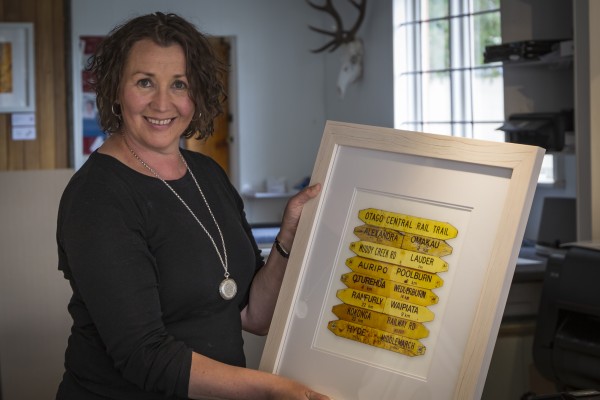 Janyne Fletcher in her gallery. Photo by Geoff Marks
Janyne Fletcher in her gallery. Photo by Geoff Marks
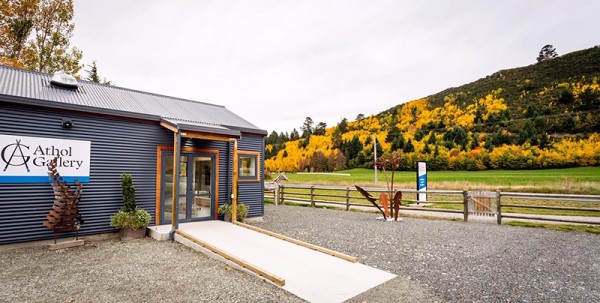 The Athol Gallery features work from a collection of artists
The Athol Gallery features work from a collection of artists
Around the Mountains Great Ride
The Athol Gallery can be found on the Around the Mountains Great Ride. It represents both established and new artists who have a deep connection to the local landscape and rural life.
From majestic portrayals of stunning scenery to capturing the everyday beauty of rural activities, Athol Gallery features a diverse selection of quality artwork, including sculptural pieces, oil paintings, watercolours and printmaking.
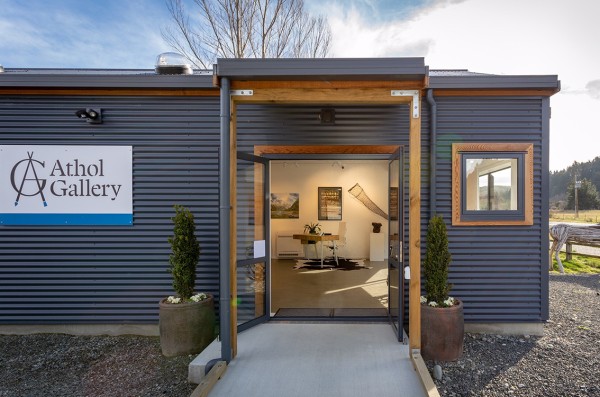 The Athol Gallery is a welcome stop on the trail
The Athol Gallery is a welcome stop on the trail
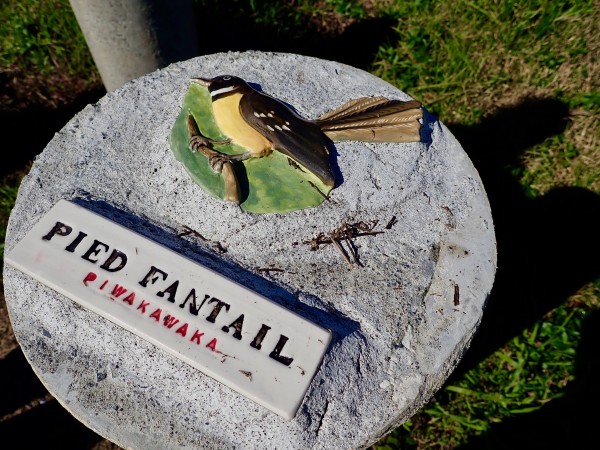 The Piwakawaka/fantail is one of many birds found on the trails
The Piwakawaka/fantail is one of many birds found on the trails
Motu Trails Great Ride
The Motu Trails celebrate the increasing birdlife in the form of handmade ceramic tiles made by local potters Margaret and Stuart Slade.
The tiles are life-sized and mounted on old concrete culvert pipes filled with rock, effectively forming a concrete plinth.
The first tiles were installed about eight years ago. Over time, nine plinths featuring 15 birds appear along the Dunes section. The birds profiled include weka, kotare (kingfisher), pukeko, matata (fern bird) and banded rail.
More culvert plinths have been installed ready for tiles of predators like rats, weasels and stoats.
The Slades not only create the tiles, they’ve also been volunteering in the conservation space for the past 40-odd years.
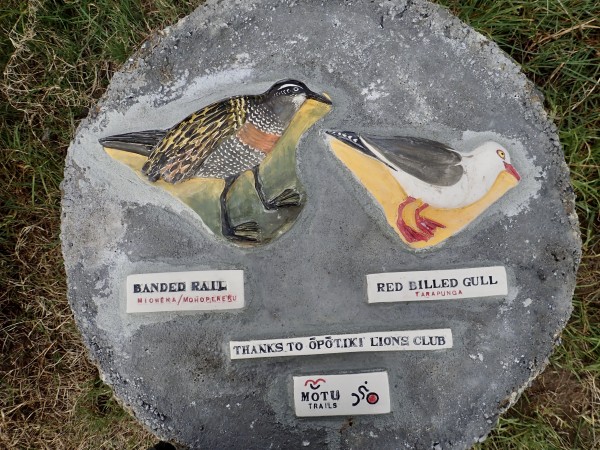 An example of the plinths featuring birds on the Dunes Trail
An example of the plinths featuring birds on the Dunes Trail
Detailed Māori rock art near Duntroon
Alps 2 Ocean Great Ride
Ride along the Alps 2 Ocean Great Ride and you’ll come across some spectacular Māori rock art near Duntroon.
The ancient Takiroa māori rock art site is a significant landmark in the traditions of Ngāi Tahu Whānui.
You’ll follow in the footsteps of Māori forefathers who navigated the length of the Waitaki River and sheltered under limestone cliffs.
It's a reminder of how the first people of this area travelled and lived hundreds of years ago.
Read more about the Great Rides and download a map of the whole network here

